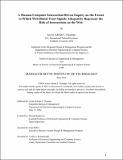A Human-Computer Interaction-Driven Inquiry on the Extent to Which Web-Based Trust Signals Adequately Represent the Risk of Interactions on the Web
Author(s)
Ocampo, Javier Adrian L.
DownloadThesis PDF (1.151Mb)
Advisor
Raghavan, Manish
Terms of use
Metadata
Show full item recordAbstract
As the global population increasingly relies on internet-based products, services, and platforms, users are becoming more vulnerable to unintended consequences. One such consequence is the increased susceptibility to malicious actors and misinformation online. This vulnerability escalates as online interactions become more sophisticated, with users increasingly depending on the internet for complex needs like social activity, banking, and education. These interactions often involve exchanges of personal data, information, and monetary assets, which have become targets for malicious actors. This thesis examines a key point of vulnerability: the user interfaces and interaction components, referred to as "trust signals," are used to assess the trustworthiness of other users and information on these platforms. The research seeks to highlight the importance of trust signals in creating secure and reliable online environments, as well as explore how poorly designed trust signals can undermine trust and contribute to instability. To uncover latent needs and insights regarding trust signals, a human-centered design process was employed as the methodology. This approach facilitated understanding of user behaviors and preferences through iterative user research and design exploration. The thesis reveals two key findings. First, the human-centered design process showed that users rely on social proofs within trust signals, often basing their trust on their understanding of the recommender's perspective. Second, users are susceptible to relying on inadequate social proof proxies, such as like counts, follower counts, or Discord server member counts, to evaluate trustworthiness in contexts for which these signals were not intended.
Date issued
2024-05Department
Massachusetts Institute of Technology. Department of Electrical Engineering and Computer Science; System Design and Management Program.Publisher
Massachusetts Institute of Technology